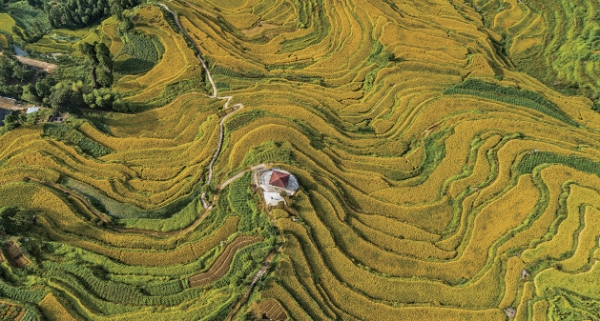| Wenzhou’s Jinchuan Organic Rice Cooperative, Typical Nationwide | |||
|
|||
A top view of the Jinchuan high mountain organic rice base. Recently, Jinchuan high mountain organic rice professional cooperative in Ruian City (county level) has been included into the fifth batch of national typical cases of new agricultural management entities, which is the only one in the city. There are a total of 45 farmers’ cooperatives and 41 family farms selected nationwide. The cooperative is located in the Duichuan Village in Lincuan Town. The rice fields are arranged along the mountain in steps from the bottom up, a bird view of them like connected and partly overlapped waves in hues of green and yellow. In 2008, the first organic rice production base in Wenzhou was established here. With an average elevation of 670 meters, Jinchuan boasts over 5,000 mu of terraced fields. At the end of 2008, Dr. Jin Liandeng from the China Rice Research Institute and Professor Zhang Weixing visited Ruian to find a test field for organic rice. After visiting Jin Chuan, they felt it is just what they want, and thus immediately decided to cooperate with local villages. In 2009, Wang Juliang, a local villager, took the lead in establishing the cooperative, encouraging farmers to plant the rice here by promising to buy the yielded rice at a price doubling that of state purchase . According to Wang, organic rice seedlings are grown in late April, transplanted in early June, and harvested in mid-October. Its growing period is nearly a month longer than that in plain. Following the Technical Specifications for Production and Quality Control of Organic Rice, the cooperative carries out production from planting to field management and processing and farmers plant uniformly. Then the cooperative handles unified purchasing and sales. Jin Chuan employs the water from the higher end of mountain to irrigate the rice fields. In stead of chemical pesticides, averaged 250 kilograms of organic fertilizer and half a picul of farmyard manure are used per mu. During the waiting period for the rice to mature, villagers manually weed the fields twice a year, and also raise ducks to eat grass. Trichogramma, natural enemy of many agricultural pests, is used to kill them by parasitizing their eggs. Nowadays, the high-quality rice produced in Jinchuan is widely lauded, and has won the Excellent Taste Award at the China International Organic Food Expo, and the Zhejiang Quality Rice Gold Award in 2019 and 2022, with the cooperative garnering dual certification for rice cultivation and processing organic products. Wang Juliang said that the cooperative has a total of 1,275 mu of rice fields and produces about 450,000 kg of unhulled rice each year, which sell well. The cooperative provides farmers with free rice seeds, organic fertilizers, biological pesticides, and other agricultural materials, and purchases their rice at a protective price of 6 yuan per kg. In addition, according to the assistance agreements signed between cooperative and low-income households, purchases are conducted at a protected price, which accumulates to 1.4 million yuan each year, bringing each low-income household an averaged income increase of more than 10,000 yuan annually. In 2022, the cooperative's operating income amounted to 6.1749 million yuan, achieving a surplus of 472,100 yuan. The second surplus of 439,200 yuan was returned to its members, benefiting nearly 300 surrounding households. In recent years, the cooperative's annual income has remained around 5-6 million yuan, mainly from selling grain. In 2021, the cooperative introduced a processing line for germ rice, with each germ rice milling machine costing a million yuan. Last year, a four-meter-high cold storage with an area of over 60 m2 was also constructed specifically for storing organic germ rice to maintain its texture. This type of organic germ rice retains over 80% of the germ, keeping both the nutrition of brown rice and the texture of polished rice. It is sold at a retail price of 30 yuan per km. Currently, over 60% of the finished rice produced by the cooperative is germ rice. In addition to rice production, the Jinchuan’s terraced fields have also become a scenic spot. Rape and purple chicory flowers in full bloom attract a large number of tourists. In a few days, they wither and turn into manure for the rice fields. Flowers seem to know how to help the villagers prepare for the upcoming busy farming season. |
|||
